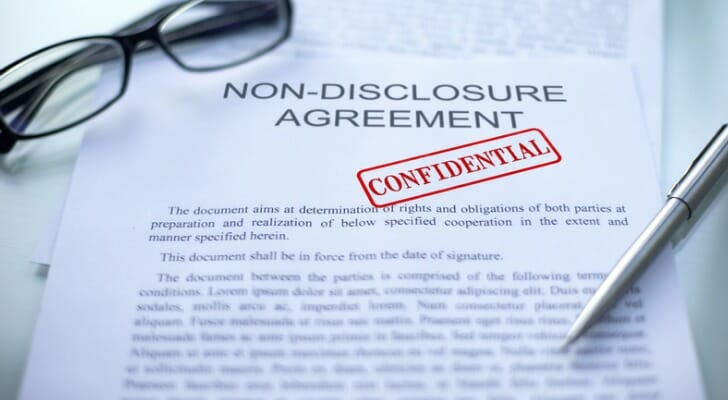 Businesses use non-disclosure agreements (NDAs) to protect company secrets. These are legal contracts in which one or more persons agree to keep certain information secret. The agreements may also be referred to as confidentiality agreements or confidential disclosure agreements. Here’s what an NDA can and can’t do, and how businesses use them.
Businesses use non-disclosure agreements (NDAs) to protect company secrets. These are legal contracts in which one or more persons agree to keep certain information secret. The agreements may also be referred to as confidentiality agreements or confidential disclosure agreements. Here’s what an NDA can and can’t do, and how businesses use them.
Who Signs NDAs
Job applicants may be asked to sign an NDA during the interview process so that information about the company’s operations can be shared with the potential employee without fear that this person will share that information with a rival.
Employees are often asked to sign NDAs as a job requirement. These NDAs aren’t always separate documents but may appear relatively inconspicuously in another document such as an employment contract.
Before signing one, it should be read and understood. If any term is unclear, the company’s owner or management should be able to explain why it’s included. And, like any contracts, NDAs can be negotiated if the signer is uncomfortable with the provisions.
Vendors and investors who might be exposed to internal information during the course of doing business with a company are also likely to be asked to sign NDAs. When companies are testing new products, they may ask focus group participants, design consultants and others to agree to NDAs.
Contents of an NDA

The content of an NDA is different from the content of documents that should be shredded.
As a legal contract, an NDA has the same requirements for identifying the parties involved as other contracts. There is also often boilerplate material describing the court in which disagreements will be settled, who will pay attorney’s fees and similar matters.
The key part of an NDA is defining the information that will be kept confidential. This could range from very broad, such as with an employer that requires secrecy about everything an employee is exposed to at work. Or it could be very narrow, such as the date of a product launch.
The NDA may also specify what won’t be kept confidential. For example, it may state that anything the owner of the information later chooses to make public won’t be covered by the agreement.
NDAs are often one-way. An employee may agree to keep the employer’s secrets while the employer makes no promises to do the same. NDAs may also be two-way. When two companies are considering merging, each may want the other to agree to keep secret information that comes up during the negotiations to be confidential.
The NDA will also spell out the obligations the contract puts on the parties. For instance, rather than simply enjoining signers to be close-mouthed, it may require them to return or destroy confidential materials. NDAs also often have a time period after which they’ll expire. This varies widely and is negotiable, but five years is a common time period.
NDAs don’t have to be long or complex. Many are simply general-purpose templates of confidentiality agreements and may include matters that aren’t relevant to the situation at hand.
What an NDA Does
The contracts typically specify that the secret’s owner can get a court order to stop a signer from revealing confidential information if it’s learned about in advance. After the fact, secret owners can sue for legal damages.
Sometimes an NDA may be intended primarily to establish that information is to be treated confidentially, rather than to give the secret’s owner a way to force discretion. For instance, in some industries compliance regulations may require companies to obtain signed NDAs even if there’s no intention of enforcing them.
For an NDA to stand up in court, the owner may need to show more is being done to protect secrets than simply requiring an NDA. For instance, a company may need to show it is locking up product plans securely and maintaining anti-intrusion technology on its computer network.
Bottom Line
 NDAs are common and effective ways for companies to reveal trade secrets when necessary while restricting the chance that the confidential information will be shared improperly with competitors or the general public. Employees are often asked to agree to keep their employers’ trade secrets confidential, but vendors, suppliers, investors and partners may also be presented with NDAs.
NDAs are common and effective ways for companies to reveal trade secrets when necessary while restricting the chance that the confidential information will be shared improperly with competitors or the general public. Employees are often asked to agree to keep their employers’ trade secrets confidential, but vendors, suppliers, investors and partners may also be presented with NDAs.
Tips for Job Seekers
- Just as you can negotiate an NDA with a potential employer, you can negotiate a starting salary. If the hiring manager can’t honor your request, he or she will likely appreciate the fact that you were willing to advocate for yourself. Even if you can’t negotiate better compensation, you could always take the job and ask for additional compensation or promotion during your performance review.
Photo credit: ©iStock.com/SergeyChayko, ©iStock.com/SDI Productions, ©iStock.com/Motortion